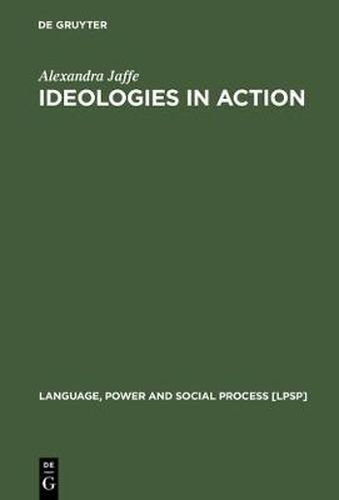Readings Newsletter
Become a Readings Member to make your shopping experience even easier.
Sign in or sign up for free!
You’re not far away from qualifying for FREE standard shipping within Australia
You’ve qualified for FREE standard shipping within Australia
The cart is loading…






In Corsica, spelling contests, road signs, bilingual education bills and Corsican language newscasts leave language planners and ordinary speakers deeply divided over how to define what counts as Corsican and how it is connected with cultural identity. In Ideologies in Action Alexandra Jaffe explores the complex interrelationship between linguistic ideologies and practices on the French island of Corsica. This detailed exploration of the ideological and political underpinnings of three decades of language planning raises fundamental questions about what it means to save a minority language, and the way in which specific cultural, political and ideological contexts shape the successes and failures of linguistic engineering efforts.
Jaffe’s ethnography focuses both on the way dominant language ideologies are inscribed in the everyday experience of ordinary people, as well as how they shape the evolving strategies of language planners trying to revitalize the Corsican language. While Jaffe’s analysis demonstrates the pervasive influence of dominant language ideologies on minority language speakers and language planners, she also draws on case studies from everyday discourse, educational practice and public and mediatized debates over language issues to develop an ethnographically-grounded perspective on levels of resistance. In the final part of the book she explores the emergence (and the limits) of radical genres of resistance found in forms of Corsican language activism and in examples of codeswitching and language mixing in bilingual radio practice.
This book contributes to a growing literature on language ideology, and will be of interest to anthropologists, political scientists and linguists interested in the practical and theoretical dimensions of language contact, minority language literacy, bilingual education, and language shift.
$9.00 standard shipping within Australia
FREE standard shipping within Australia for orders over $100.00
Express & International shipping calculated at checkout
In Corsica, spelling contests, road signs, bilingual education bills and Corsican language newscasts leave language planners and ordinary speakers deeply divided over how to define what counts as Corsican and how it is connected with cultural identity. In Ideologies in Action Alexandra Jaffe explores the complex interrelationship between linguistic ideologies and practices on the French island of Corsica. This detailed exploration of the ideological and political underpinnings of three decades of language planning raises fundamental questions about what it means to save a minority language, and the way in which specific cultural, political and ideological contexts shape the successes and failures of linguistic engineering efforts.
Jaffe’s ethnography focuses both on the way dominant language ideologies are inscribed in the everyday experience of ordinary people, as well as how they shape the evolving strategies of language planners trying to revitalize the Corsican language. While Jaffe’s analysis demonstrates the pervasive influence of dominant language ideologies on minority language speakers and language planners, she also draws on case studies from everyday discourse, educational practice and public and mediatized debates over language issues to develop an ethnographically-grounded perspective on levels of resistance. In the final part of the book she explores the emergence (and the limits) of radical genres of resistance found in forms of Corsican language activism and in examples of codeswitching and language mixing in bilingual radio practice.
This book contributes to a growing literature on language ideology, and will be of interest to anthropologists, political scientists and linguists interested in the practical and theoretical dimensions of language contact, minority language literacy, bilingual education, and language shift.